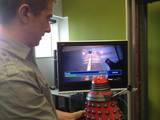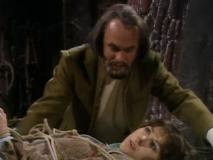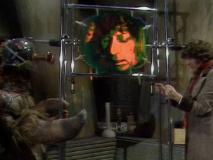Universal Control Daleks
Friday, 25 November 2011 - Reported by Chuck Foster
The BBC Research and Development Department have been studying how future television communications can be utilised to assist in functions within the viewing environment:
However, several media sites reporting on the demonstration that took place at the R&D Lab in MediaCity last week implied the technology was just around the corner, leading the department to clarify otherwise:
The practical application of such technology can lead to the development of devices such as those that can provide 'single-switch' remote control interfaces for severely disabled people, or speech-operated controls for those whose vision has been impaired.
(newslink: BBC R&D Blog)
In short, the technology allows an internet-connected device, whether that’s a smartphone, a pair of headphones (or in our case, a toy Dalek) to pick up Wi-Fi signals synchronised to the TV programme, to allow that device to perform a specific function at a specific time. We call this technology Universal Control.
The Dalek mentioned above was a prototype developed by Andrew Bonney to demonstrate how such technology could work, in this case having the toy react upon scenes broadcast that involved its television counterpart.Andrew's deft modification of an off-the-shelf Dalek toy achieved everything we wanted from the project. We gained valuable insights into the challenges of developing Universal Control clients for an embedded platform with just 32kB of RAM, while demonstrating their feasibility in a very striking way. It's also an entirely new take on the concept of "dual screen", demonstrating that the things you can synchronise to a TV programme go way beyond smartphone and tablet applications.
Developing toys is not part of BBC R&D's remit! But the Dalek helps us with a part of our mission that is far more important: helping BBC programme makers understand how changes in technology could affect their work. As computing power continues to become cheaper and as more and more devices gain wireless connections to each other and to the Internet, we expect to see an increasing number of everyday things gaining these capabilities.
Developing toys is not part of BBC R&D's remit! But the Dalek helps us with a part of our mission that is far more important: helping BBC programme makers understand how changes in technology could affect their work. As computing power continues to become cheaper and as more and more devices gain wireless connections to each other and to the Internet, we expect to see an increasing number of everyday things gaining these capabilities.
However, several media sites reporting on the demonstration that took place at the R&D Lab in MediaCity last week implied the technology was just around the corner, leading the department to clarify otherwise:
Of course, this is the world of R&D. Today's televisions and set-top boxes don't support the Universal Control API, or anything like it, so you won't see WiFi-enabled Daleks taking over your living room this Christmas. But we firmly believe that the experiments broadcasters are currently performing with Dual Screen experiences are just the tip of the iceberg, and that tomorrow's television programmes won't always be confined to a screen in the corner of the living room.
The practical application of such technology can lead to the development of devices such as those that can provide 'single-switch' remote control interfaces for severely disabled people, or speech-operated controls for those whose vision has been impaired.
(newslink: BBC R&D Blog)
Watch the Universal Control Dalek demonstration, courtesy of RegHardware














